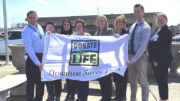The Associated Press
Some of Pennsylvania’s largest health systems are delivering a reality check after the state greatly expanded eligibility for the COVID-19 vaccine this week, pointing out there’s not nearly enough supply to meet surging demand.
Pennsylvania, which surpassed 20,000 deaths attributed to the coronavirus pandemic on Thursday, has expanded initial eligibility for the vaccine to include people age 65 and over as well as younger people with serious health conditions that put them at higher risk. The state had previously been directing the vaccine to health care workers and residents of long-term care facilities.
The expansion means that some 3.5 million people are now eligible to receive one of the two approved vaccines.
The problem, hospital officials say, is that weekly allotments are still extremely limited, and there is no indication when the vaccine might begin arriving in sufficient quantity to allow them to invite more people to roll up their sleeves.
“We simply do not have adequate vaccine supplies or clear notification of when and how much is coming to be able to meet this new, much larger group who can benefit,” said a statement released by a consortium of 11 western Pennsylvania hospitals and health systems. “That means many requests for vaccination will not be met in the next days to weeks, and this is not from a lack of desire.”
One of the consortium members, UPMC, reported a surge in interest after the state’s announcement on Tuesday.
“People began to think, ‘I need to be calling right now, and that this means this minute, this hour,’” Dr. Donald Yealy, UPMC’s senior medical director, said Thursday.
Yealy said UPMC is ready to put more shots into arms, but will, for now, remain focused on inoculating health workers and residents and staff at nursing homes. He said UPMC does not plan to schedule appointments for people who are newly eligible for the vaccine until it has an adequate supply.
“We need a lot more vaccine, and a clear knowledge of when it’s coming,” Yealy said. “I don’t want to promise people in those age groups and those condition groups vaccine that isn’t here.”
The expanded first phase of the state’s vaccine plan now includes people who are 65 and older; smokers; pregnant women; clinically obese people; and under-65 residents with medical conditions such as cancer, lung disease, heart failure, Type 2 diabetes or a compromised immune system. The Health Department has said its updated coronavirus vaccine plan tracks with recommendations from the federal government
More than 450,000 people in Pennsylvania have received at least one dose of the vaccine since shipments began last month.
Like UPMC, Lehigh Valley Health Network said it doesn’t have adequate supply of the vaccine to begin inoculating patients whom the state made eligible this week, though it is allowing them to register.
The health system’s ability to offer the shot to that larger group “depends on us getting the vaccine supply, and we do not know when or how much we are going to receive,” said Brian Downs, a Lehigh Valley spokesperson.
By contrast, Geisinger, another large health system, said it’s beginning to vaccinate people who meet the state’s expanded criteria. So is Penn State Health, though it also warned that its supply is not sufficient to reach as many as 200,000 patients the health system has identified as currently being eligible.
Municipal health departments are facing the same constraints.
At its current allotment, Montgomery County, which has its own health department, said it could be a year before everyone who is now eligible for the vaccine is inoculated. More than 250,000 people in Montgomery County are in that first grouping; to date, the county has given shots to more than 10,000.
Even though the state dramatically expanded eligibility, “there has been no comparable increase in the amount of vaccine that we are receiving,” said Dr. Val Arkoosh, a physician and chair of the Montgomery County Board of Commissioners. “We have a really long way to go here, and we all have to hope that the supply of vaccine increases.”
She added: “I know this has been really confusing and very frustrating for a lot of people.”
The slow vaccine rollout comes as the state Health Department reported another 260 deaths from the new coronavirus, pushing the statewide total past 20,000 since the beginning of the pandemic.
New confirmed infections and hospitalizations in Pennsylvania have been drifting down.








































